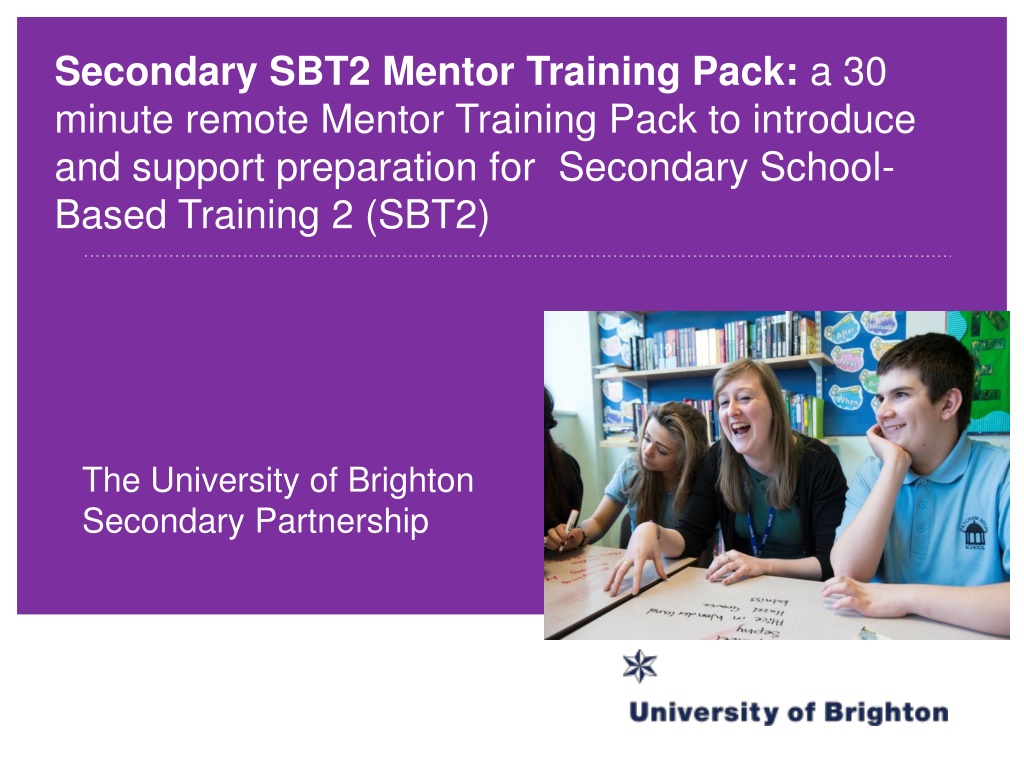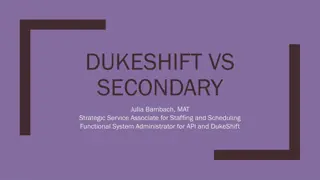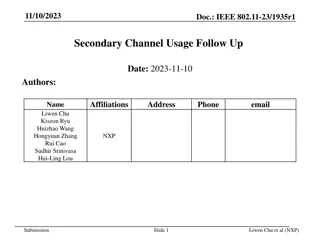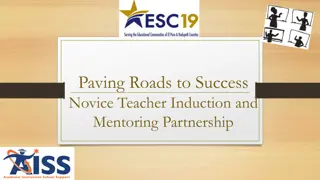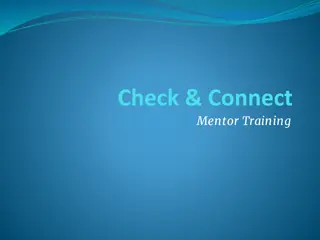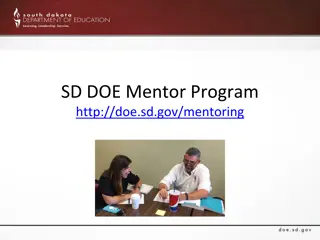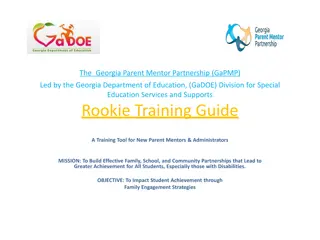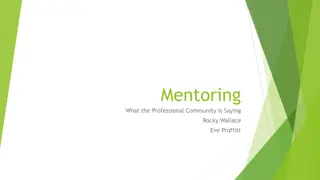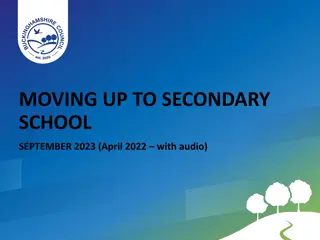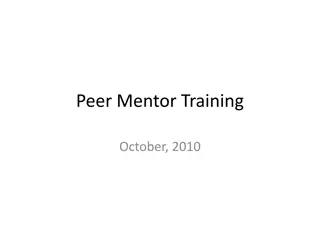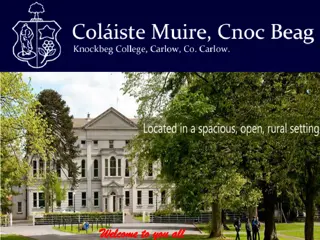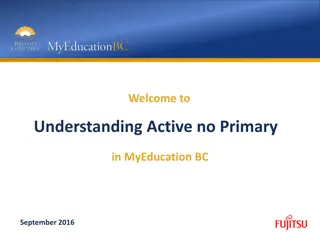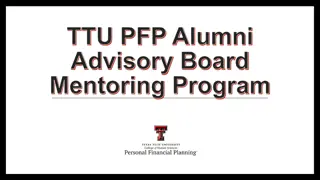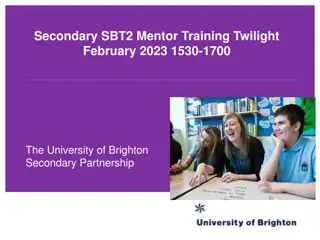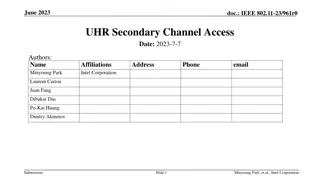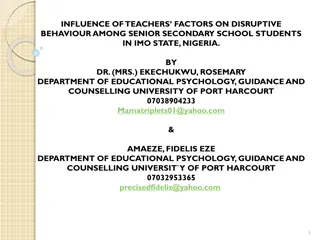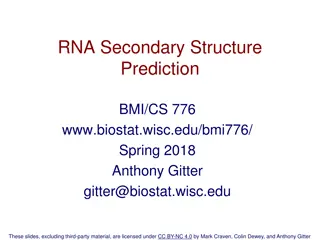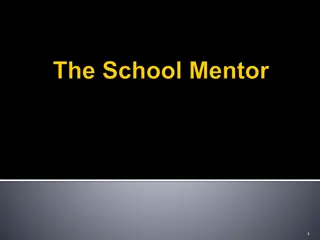Secondary School-Based Training 2 (SBT2) Mentor Training Overview
Welcome to the Secondary SBT2 Mentor Training Pack, a 30-minute remote training session to introduce and prepare mentors for their role in the partnership with the University of Brighton. This pack covers key mentor preparation topics such as available training, access to handbooks, the ITTCCF, trainee timetable, mentor meetings, learning outcomes, assessment dates, lesson planning, e-Portfolio usage, observation of other teachers, and offers an opportunity for questions. Mentors play a crucial role in shaping the next generation of teachers, and various training resources are provided to support them in their role.
Download Presentation

Please find below an Image/Link to download the presentation.
The content on the website is provided AS IS for your information and personal use only. It may not be sold, licensed, or shared on other websites without obtaining consent from the author. Download presentation by click this link. If you encounter any issues during the download, it is possible that the publisher has removed the file from their server.
E N D
Presentation Transcript
Secondary SBT2 Mentor Training Pack: a 30 minute remote Mentor Training Pack to introduce and support preparation for Secondary School- Based Training 2 (SBT2) The University of Brighton Secondary Partnership
Welcome! On behalf of the secondary team here at the University of Brighton (UoB), it is our pleasure to welcome you to the School of Education (SoE) and express how glad we are that you will be working in Partnership with us during SBT2. We are really looking forward to working with you and together being involved in the life changing process of training the next generation of teachers. Please work your way through this mentor training pack of frequently asked questions as an introduction to key SBT2 mentor preparation. Dr Tom Newlands Course Leader Sharon Reilly Practice Learning Lead
Structure of SBT2 Mentor Training Pack 1. 2. 3. 4. 5. 6. What mentor training is available? How do I access SBT2 handbooks? What is the ITTCCF and how is it used? What is the SBT2 trainee timetable? When are mentor meetings and how are they structured? What are the SBT2 learning outcomes and assessment dates? 7. 8. 9. What approach is taken to lesson planning during SBT2? What is the e-Portfolio and how is it used during SBT2? How important is observation and deconstruction of other teachers lessons? 10. Finally Any Questions?
Item 1: What mentor training is available? Mentors are key to the success of our partnership and to the development of the next generation of teachers. We offer three forms of training to help support you in your role during SBT2. 1) GENERIC ONLINE MENTOR TRAINING 35 minutes This is a partnership wide e-Learning course that covers everything you need to know about being a UoB partnership mentor. It covers all of the expectations and processes that are non programme specific such as approach to induction, assessment and key mentoring skills. It is particularly suitable for new mentors (full course) or as a refresher which allows you to focus on specific areas of training that you are unsure about. To access see link on next slide or visit the SBT Blog secondary subject-specific pages.
Access to Generic Online Mentor Training https://blogs.brighton.ac.uk/mentors/training/
Continued 2) SBT2 MENTOR TRAINING PACK 30 minutes This is ideally engaged in by all mentors remotely prior to attendance at a remote Mentor Twilight Subject Specialism Session. 3) SBT2 MENTOR TWILIGHT SUBJECT SPECIALISM SESSION 90 minutes You are invited to attend this on either Thursday 9th February OR Tuesday 21stFebruary from 1530- 1700 via Teams Here you will meet the university subject team and have the opportunity to ask questions that may have arisen in completing the Mentor Training Pack or reading the handbooks. Details of the process of how to join the remote session will be released prior to the session via email.
Item 2: How do I access SBT2 handbooks? There are THREE handbooks to support you the first two being key to your mentor role: 1. Secondary Professional Year Professional Tutor and Mentor Handbook 2022-23 2. SBT2 Weekly Overview Target Setting and Action Planning Handbook 2022-23 3. Secondary Partnership in Education Handbook (PiE) 2022-23 All can be accessed on the subject-specific pages of the SBT Blog- a one stop destination for handbooks, forms exemplars etc: https://blogs.brighton.ac.uk/mentors/mentoring- resources/secondary/
Item 3: What is the Initial Teacher Training Core Content Framework (ITTCCF) and how is it used? Initial Teacher Training Core Content Framework (ITTCCF) DfE 2019 This defines the minimum entitlement of all trainees and sets out the content that ITT providers and their partners must draw upon when designing and delivering programmes across university and school-based training: Initial teacher training (ITT): core content framework - GOV.UK (www.gov.uk) The ITT Core Content Framework has been implemented from September 2020.
Learn that and Learn how statements The CCF has been a key document in the sequencing of our provision and ensuring trainee progression here at Brighton. It has been designed to support trainee development in five core areas: behaviour management, pedagogy, curriculum, assessment and professional behaviours. It is presented within 8 key sections that align with the Teachers Standards: High Expectations (TS1), How Pupils Learn (TS2), Subject and Curriculum (TS3), Classroom Practice (TS4), Adaptive Teaching (TS5), Assessment (TS6), Managing Behaviour (TS7) and Professional Behaviours (TS8). Each section contains a range of learn that (evidence) and learn how to (practise) statements / principles, however, this is not meant to be an assessment framework and must not be used as such.
Implications for practice The ITTCCF (DfE, 2019, p.5) details how ITT providers and partners can support the development of trainees, summarising five key activities that we have embedded: 1. An entitlement to practise key skills. 2. An opportunity to work with and learn from expert colleagues [teachers, mentors, university tutors etc]. 3. Discussing and analysing with expert colleagues. 4. Observing how expert deconstructing this approach deconstruction]. 5. Receiving clear, consistent and effective mentoring. colleagues [observation and and
Impact of ITTCCF at UoB This has informed / influenced the following areas: Our curriculum structure and progression The creation of curriculum maps against the Learn that statements of the ITTCCF Weekly Overviews with targets and actions University and School-based training learning outcomes Lesson planning and evaluation Observation and Deconstruction Assessment of trainees The use of a shared language for pedagogy
Item 4: What is the PGCE / 2 Year BA SBT2 trainee timetable in the embedding and enhancing stages? During the SBT2 period of the course, trainees are required to teach a timetable that equates to 60% of a teacher s usual timetable in the school/college e.g. if a teacher takes 20 out of 25 lessons in a week, trainees will teach 12 lessons per week. Time for mentor meetings, professional studies programmes, observation of skilled practitioners and other non- teaching activities is in addition to this. Trainees work with classes will develop from initial periods of observation of experienced subject teachers, to assisting them and also working with small groups of pupils. It is expected that trainees will commence teaching in the second week and increase to a 60% timetable (normally just before or after the Easter break).
In addition 1 period a week for a mentor meeting (usually 1 hour ) 1 period a week for preparation for the mentor meeting 1 period for the school Professional Studies programme 1 period of observation of other teachers 1 period a week as a TA
What is the SDT SBT2 trainee timetable in the embedding stage? Other School Phase 1: - Week 1: Induction. - Week 2: teaching teaching episodes. - Week 3 onwards: Trainees move to 60% of a timetable. Begin and small leading group short usual teacher s
In addition 1 period a week for a mentor meeting (usually 1 hour ) 1 period a week for preparation for the mentor meeting 1 period for the school Professional Studies programme 1 period of observation of other teachers
Item 5: When are mentor meetings and how are they structured? We require that mentor meetings are: Weekly Timetabled Held in an appropriate space to minimise distractions Structured using the mentor meeting (SH) pro forma Prepared for beforehand by the trainee Usually 1 hour
Mentor meeting (SH Form) The mentor meeting is structured in three parts as detailed on the SH pro forma: A) Trainee reflection on professional learning and review of targets B) A professional development discussion C) Completion of Professional Action Plan targets and actions (with use of pre-set targets). This pro forma and an exemplar can be found on the subject-specific pages of the SBT blog and it is the trainee s responsibility to complete it. You might look at completed SH forms from SBT1 in your trainee s ePortfolio.
Item 6: What are the SBT2 learning outcomes and assessment dates? Throughout their training trainees are expected to meet progressively increasing expectations for planning, teaching, assessment and professional and personal conduct. In structuring the course, trainees typically progress through three stages in terms of their practice and professional development with learning outcomes that increase in challenge. These are: 1. the Emerging Stage from the beginning of the course till the end of SBT1, 2. the Embedding Stage till mid-SBT2 (or end of SBT2 phase 1 for SDT), 3. and the Enhancing Stage by the end of the course.
ET686/8 (SBT2) Learning Outcomes By the end of the second period of SBT, the trainee will be able to meet the following learning outcomes: LO1 - Make effective use of a variety of behaviour management strategies appropriate to context and age phase, adapting them to meet the needs of learners (TS1, TS5, TS7) LO2 - Independently plan, teach and evaluate sequences of lessons which reflect secure subject and pedagogical knowledge appropriate to the context, curriculum and age phase (TS1, TS2, TS3, TS4, TS5, TS6) LO3 - Use assessment effectively to inform planning, support pupil progress and address the needs of individual learners; (TS2, TS5, TS6)
ET687/9 (SBT2) Learning Outcomes Continued LO4 - Autonomously reflect on and improve practice by evaluating the impact of teaching decisions on pupil learning and identify appropriate future professional development targets, including those related to the Early Career Framework (TS2, TS4, TS8) LO5 - Contribute actively to both teaching teams and the wider school whilst assuming the responsibilities of a teacher (TS4, TS5, TS8, Part II) LO6 - Demonstrate consistently high personal and professional conduct as required by the University of Brighton Code of Personal and Professional Conduct and Part II of the Teachers Standards
Key Assessment Dates SB interim report due SC final report due Friday March 31st2023 Friday May 19th2023 PGCE / 2 Year BA Friday March 31st2023 SDT Phase 1 Friday May 19th2023 SDT Phase 2 Please send all assessment reports to: educationsecondaryreports@brighton.ac.uk
SA Progress Reports Two SA progress reports should be completed during each SBT: 1. One is completed jointly by the university subject tutor and mentor when the SBT visit is made though the university tutor writes this up. 2. A second is completed by the mentor we would suggest three or four weeks prior to the end of SBT2 so this can inform target setting and the final SC. Please note that for SDT trainees two SA progress reports should be completed during SBT2 Phase 1 and two during SBT2 Phase 2.
Item 7: What approach is taken to lesson planning during SBT2? Every subject route has its own lesson plan pro forma which has been updated this year that can be found on the subject-specific pages of the SBT Blog. It is our expectation that all lessons taught must have a written plan usually submitted 2 working days in advance of the lesson to the mentor/class teacher for written/verbal feedback prior to teaching the lesson. All lessons must be evaluated by the trainee in order to inform future teaching and learning.
During the early SBT2 period, lesson plans must be full and detailed for all of the lessons taught. However, during SBT2 it is likely that there will come a point when a trainee has demonstrated that they are highly competent in planning lessons and is then able to move to producing far less detailed lesson plans on the UoB proforma while still managing to deliver high quality teaching and learning that enables pupil progress. This movement to less detailed planning using the lesson plan pro forma should only happen with the agreement of the mentor.
In addition to writing individual lesson plans, it is our expectation that trainees write units of work / sequences of lessons. These can be either interpretations of the department s schemes / units of work or new units of work / sequences of lessons for the benefit of the whole department. Trainees should do so at least once during each SBT period and upload these to their e-Portfolio (PebblePad) to facilitate off-site monitoring and support of the trainees.
Item 8: What is the e-Portfolio and how is it used during SBT2? The trainee will send the mentor a link to their e-Portfolio and it is the trainee s responsibility to organise the e- Portfolio within these folders guidance to trainees is as follows: 1. Pen Portrait: This is a single page record of relevant previous experience and Secondary Professional Year. 2. Teachers Standards: This section is where the Teachers Standards Parts 1 and 2 can be seen that need to meet by the end of the Secondary Professional Year. progress throughout the
Continued 3. School-Based Training (SBT) 1 and 2: This includes the following sub-sections: SBT2 Details SBT2 Mentor Meetings (SH forms) SBT2 Other Forms (e.g. SA, SB, SC and SD forms) SBT2 Lesson Plans SBT2 Observations SBT2 SEND Audit SBT2 Professional Reflections
Continued . 4. 3Rs Behaviour Management Audit 5. FUNK: Fundamental Knowledge in English and Maths
PebblePad Continued 6. Specialist Subject Development: This includes the following sub-sections: - Subject Audit - Critical Reflections - University-Based Training - Personal Portfolio 7. Career Entry Plan (CEP): This is completed towards the end of the course in preparation for the ECT years.
9. How important is observation and deconstruction of other teachers lessons? The ITT Core Content Framework emphasises the importance of lesson observation of how expert colleagues teach and deconstruction of this with a teacher. In the subject-specific pages of the SBT Blog, you can find a guide to observing other teachers lesson for trainees and their mentors that we recommend you use. It is an expectation that trainees observe at least one lesson a week and upload the observation to their ePortfolio,
Item 10: Finally - Any Questions? If you have any questions you can: Ask subject route leaders/tutors at the Mentor Twilight Subject Specialism Session on either Thursday 9thFebruary OR Tuesday 21st February from 1530-1700 via Teams Contact: educationplacements@brighton@ac.uk We look forward to working in partnership with you!
